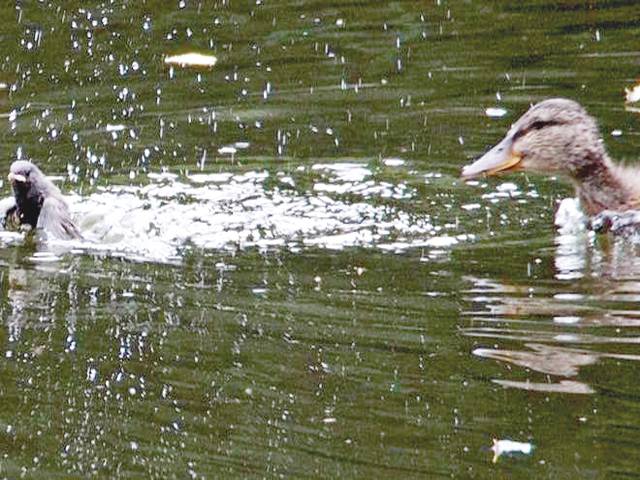Romania-Wild mallard ducks have been observed attacking and eating migratory birds.
This has never been documented before and is probably a new behaviour, say scientists. Zoologists at the University of Cambridge filmed a group of mallard ducks hunting other birds on a reservoir in Romania. Two fledglings - a grey wagtail and a black redstart - were chased and swallowed when they landed in the water. Mallards are one of the most abundant types of wild duck, and a common sight in parks and on lakes.
The duck normally snacks on seeds, acorns, berries, plants and insects.
It has, on occasions, been seen to eat small fish, but bigger vertebrates are normally strictly off the menu.
Dr Silviu Petrovan noticed the unusual behaviour of a group of mallards while he was out bird watching with friends near a national park in southwest Romania. He saw the adult female duck grab the grey wagtail in her beak, and repeatedly submerge it in the water, before eventually eating it.
A second bird - a fledgling black redstart - then landed in the water, where it was chased by juvenile mallard ducks.
“The poor bird landed on the water and was screaming and trying to navigate itself out of danger,” said Dr Petrovan. “Then it was almost instantaneously attacked by the mallards.”
The bird eventually disappeared - assumed to be drowned or consumed.
The scientists could find no record of mallard bird predation in the scientific literature, which suggests such behaviour is both “very rare” and newly-learned.
“The mallard was massively struggling to eat that wagtail, presumably because it couldn’t actually tear it to pieces because the bill is flattened - it’s not designed for ripping prey apart,” said Dr Petrovan.
Ducks by nature are seldom aggressive and tend not to enjoy novel food.
However, mallards in California have been seen to enter the sea to feed on sand crabs, perhaps to find new sources of high-energy protein.
The same may be happening at the reservoir, which is largely deep-water.
“Potentially there is quite a lot of pressure for those fast-growing juveniles to get animal protein intake, and therefore they are looking at opportunities to supplement that,” said Dr Petrovan.






